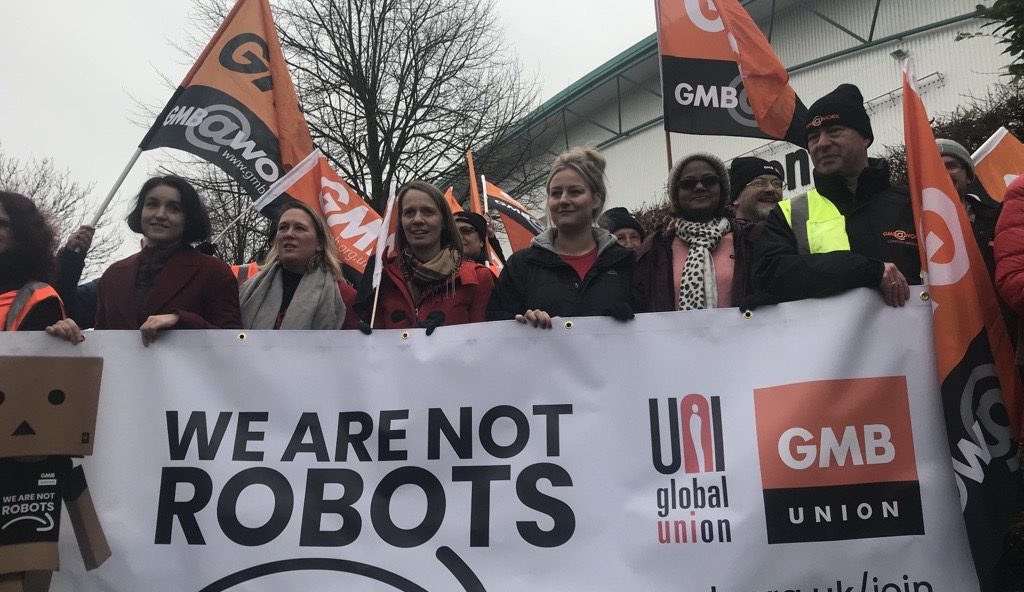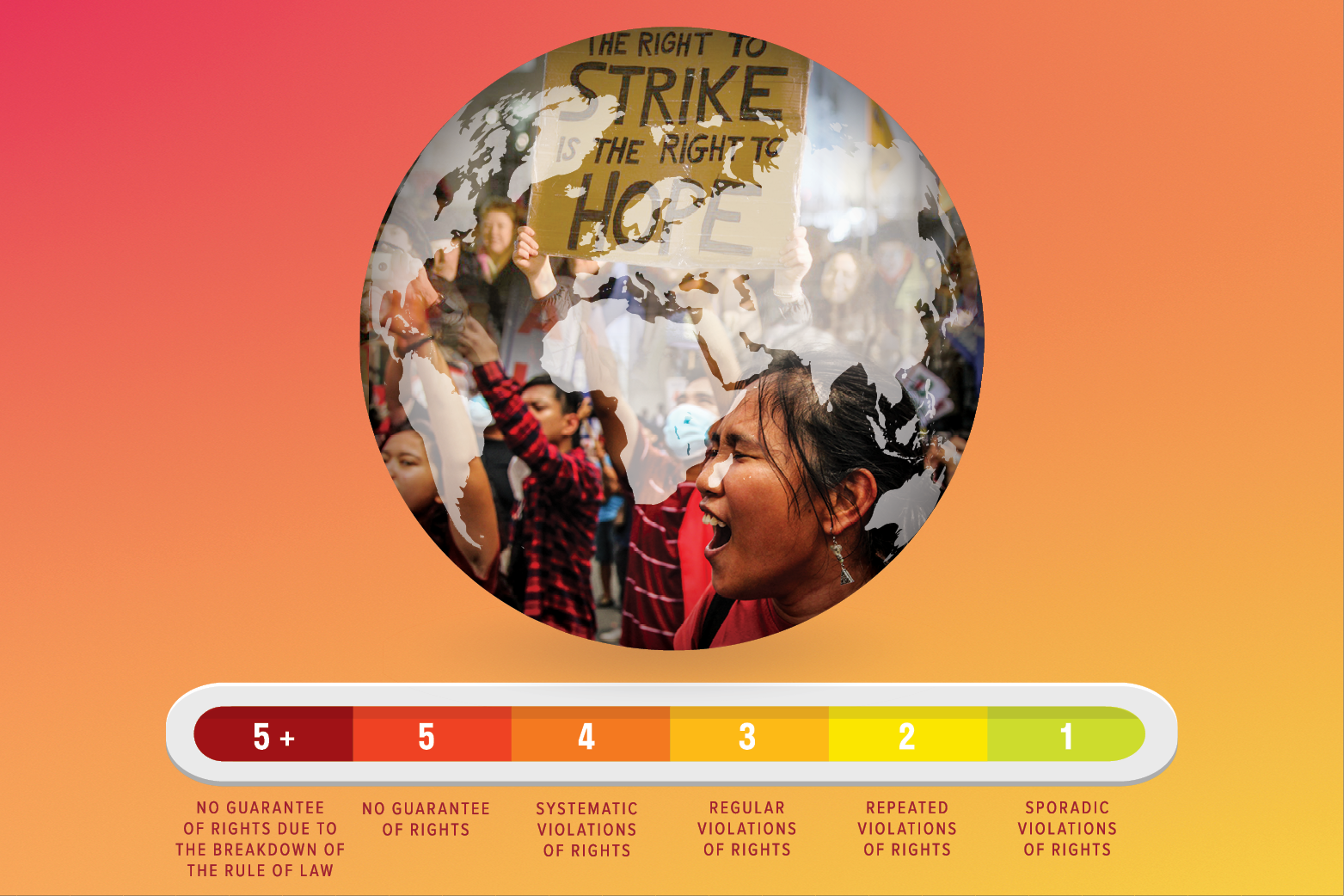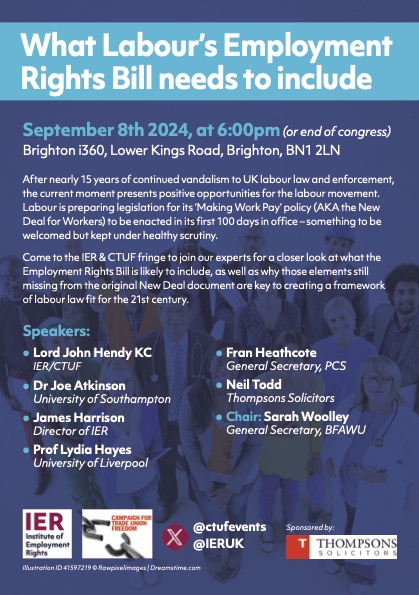Category: Global Employment Rights
The Right To Strike: The Heart Of Worker Empowerment
 By IndustriALL Global Union General Secretary, Atle Høie
By IndustriALL Global Union General Secretary, Atle Høie
The right to strike and the right to organize are fundamental pillars of worker empowerment, enshrined in International Labour Organization (ILO) Conventions 87 and 98. These rights are essential for workers and unions to protect their interests and assert their power against the enormous economic and political influence of employers. Without the ability to strike, workers are left defenseless in wage negotiations, working conditions, and basic workplace dignity.
At the core of these protections is the right to organize. This right allows employees to unite and advocate collectively on shared issues.
However, in some parts of the world union discrimination is widespread. Even companies that engage in collective bargaining resist unionization efforts where they can, undermining the fundamental rights of their workers. A striking example is the recent action by IndustriALL affiliate United Auto Workers (UAW), which filed federal labour charges against former US President Donald Trump and Tesla CEO Elon Musk.
The charges accuse them of illegally threatening and intimidating workers who stand up for their rights by engaging in strikes. This case underlines the ongoing global struggle for labour rights, even at companies with significant international influence. Tesla, a company notorious for its anti-union stance, employs over 120,000 workers worldwide yet refuses to engage in collective bargaining.
Attempts to organize within Tesla have been met with fierce resistance, with Elon Musk himself threatening retaliation against workers who attempt to unionize. This has led to significant tensions with labour unions, particularly in Sweden. Swedish union IF Metall became the first to take action against Tesla’s anti-union practices, initiating industrial action on 27th October 2023 in 12 Tesla-owned garages and expanding to 20 more locations. Despite brief negotiations in November last year, Tesla remained steadfast in its refusal to sign a collective agreement. The company’s management has dismissed labour rights, arguing that they are not part of “the company’s concept.” Elon Musk has publicly criticized unions, claiming they create division and negativity within companies. IndustriALL general secretary, Atle Høie, says: “Elon Musk’s business model is one that is designed to avoid respecting human rights. We must defend workers and the rights that they have fought so long for. We stand with the UAW in their fight.”
This conflict is not just about Tesla and its workers—it is a symbol of the broader battle for labour rights and the critical importance of the freedom to organize and strike. Without these rights, workers around the world remain vulnerable to exploitation and injustice.
The right to strike is not just a tool—it is a crucial defense that ensures workers can stand up for themselves and each other.
UK Amazon Dispute: GMB Pushes For Historic Recognition
 After a long and contentious battle, the GMB is on the verge of becoming the first recognised trade union at an Amazon warehouse in the UK and Europe.
After a long and contentious battle, the GMB is on the verge of becoming the first recognised trade union at an Amazon warehouse in the UK and Europe.
In the coming weeks, GMB will hold a ballot for union recognition at Amazon’s Coventry warehouse. The UK union movement stands united behind Amazon workers, pushing for this historic victory against one of the world’s most powerful corporations.
How it began
The roots of the campaign began in December 2022 when Amazon Coventry warehouse staff voted, for the very first time in the UK, to strike over a 50p per hour pay rise. With a 63% turnout from 300 members, an overwhelming 98% voted to strike, well above the required threshold.
Workers described the pay offer as “a kick in the teeth”. In some cases they’d had to turn to food banks to feed their families and were struggling to pay bills, all while working tirelessly throughout the pandemic.
Workers demand better
Beyond the insufficient pay offer, dissatisfaction grew over general working conditions. Reports emerged of fainting incidents due to prolonged standing, and a GMB freedom of information request revealed that ambulances were called to the Coventry site 59 times between September 2018 and October 2021 for issues ranging from burns to traumatic injuries.
The workers’ demands were clear: £15 per hour and immediate improvements to working conditions. On 25 January 2023, GMB members headed for the picket line for the very first time in the UK, initiating over 30 days of industrial action at the Coventry warehouse.
The setbacks
On 8th June 2023, GMB had to withdraw its bid for recognition at Coventry after Amazon increased its reported number of workers to 2,700, a claim accepted by the Central Arbitration Committee (CAC), with the GMB accusing Amazon of ’dirty tricks’.
Despite this setback, GMB intensified its efforts, leading to significant action on 24th November 2023, with protests and coordinated strikes across Europe and the USA.
Another new Amazon centre faces strike action
On January 2024, GMB members at a new centre in Birmingham, which opened in October 2023, voted to strike over pay and conditions. Strikes commenced on 25th January 2024, exactly one year after the initial Coventry stoppage, with 100% of GMB members at the Minworth fulfilment centre voting for industrial action. This marked the third UK Amazon warehouse to formally vote for strike action.
Workers grow in strength
Trade union membership in Coventry continued to grow exponentially. In 2023 alone, GMB membership at the Amazon warehouse in Coventry surged by 5,000%, highlighting the growing strength of feeling amongst members at Amazon. GMB attributed their recruitment success to natural workplace leaders, the diversity of the workforce, and proactive union organisers who engaged with workers regularly, empowering them in decision-making processes.
Dirty tricks
Throughout the campaign, Amazon employed various union-busting tactics, including posting anti-union notices and offering union members a £2,000 incentive to transfer to other sites around the Midlands to dilute the membership numbers.
Despite these challenges, GMB turned these tactics into recruitment opportunities, growing membership at other sites by using those transferred members to start conversations in new workplaces. This strategy proved effective, as evidenced by the recent industrial action at Amazon’s new flagship site in Birmingham.
On the verge of first-ever trade union recognition
GMB, confident in the growing number of members at the Coventry site, relaunched their campaign for recognition at the warehouse early this year. On 19th April 2024, the CAC ruled in favour of a union recognition vote, determining that a majority of workers would likely support union recognition. This decision paves the way for a legally binding vote among Amazon Coventry’s workforce.
The CAC will appoint an independent scruitineer to arrange a legally binding vote of workers, with the ballot timetable expected to be announced in the coming weeks. All that remains before the official voting period can begin is an agreement on access at the site between employer and the GMB, but that is expected to be resolved soon.
Amazon could be on the brink of being forced to recognise a trade union for the first time and the TUC will be working alongside and supporting GMB to ensure the best possible turnout. If the ballot is successful, this would see a recognised trade union footprint in Amazon in the UK for the very first time. Union recognition would mean Amazon would be forced to sit down with GMB on matters relating to pay, hours, and holidays; the first time this has been achieved anywhere in the world outside of the USA.
Speaking on the significance of the recognition bid, Paul Nowak, TUC General Secretary said: “It’s vital that we all get behind Amazon workers. Good employers recognise the value of trade unions and how they can make workplaces happier, safer, and more productive. Too many workers in this country are treated like disposable, throwaway labour. And too many decent companies are being undercut by the bad.”
“This campaign, like many others, highlights the urgent need for legal reforms to allow unions access to workplaces and to eliminate unnecessary barriers to recognition.”
2024 ITUC Global Rights Index
 The 2024 ITUC Global Rights Index makes for difficult reading – a clear and urgent wake-up call that the democratic values and fundamental rights agreed upon by most countries at an international level are crumbling.
The 2024 ITUC Global Rights Index makes for difficult reading – a clear and urgent wake-up call that the democratic values and fundamental rights agreed upon by most countries at an international level are crumbling.
ITUC General Secretary Luc Triangle said: “For 11 years now the Index has tracked a rapid decline in workers’ rights in every region of the world. Workers are the beating heart of democracy, and their right to be heard is crucial to the health and sustainability of democratic systems. When their rights are violated, democracy itself is attacked. Democracy, trade unions and workers’ rights go together; you simply cannot have one without the other.”
The ITUC Global Rights Index is a comprehensive review of workers’ rights in law ranking 151 countries against a list of 97 indicators derived from ILO Conventions and jurisprudence, and as such is the only database of its kind. It rates countries on a scale from 1 to 5+ based on the degree of respect for workers’ rights. Violations are recorded each year from April to March.
The 10 worst countries for working people are: Bangladesh, Belarus, Ecuador, Egypt, Eswatini, Guatemala, Myanmar, the Philippines, Tunisia and Türkiye.
• Twenty-two trade unionists were killed in six countries: Bangladesh, Colombia, Guatemala, Honduras, the Philippines, and the Republic of Korea.
• Conditions are so bad in 12 countries due to the breakdown of the rule of law that they are rated 5+.
• Only two countries have seen their rating improve in 2024: Romania has moved from 4 to 3 and Brazil is now rated 4, an improvement on 5 last year.
• Thirteen countries have worse ratings: Costa Rica, Finland, Israel, Kyrgyzstan, Madagascar, Mexico, Nigeria, Qatar, the Russian Federation, Saudi Arabia, Sudan, Switzerland and
• 87% of countries violated the right to strike.
• 79% of countries violated the right to collective bargaining.
• 75% of countries excluded workers from the right to establish or join a trade union.
• 74% of countries impeded the registration of unions.
• In 65% of countries, workers had no or restricted access to justice.
• 43% of countries restricted free speech and assembly.
• Workers were arrested and detained in 74 countries.
• Workers experienced violence in 44 countries.
• Europe has an average rating of 2.73, down from 2.56 in 2023, continuing a rapid deterioration from 1.84 in 2014 – the biggest decline seen in any region in the world over the past 10 years.
• The worst region in the world for working people is the Middle East and North Africa, with an average rating of 4.74, worse than the 4.53 it received in 2023, and the 4.25 rating it had in 2014. The rights to collective bargaining, to join a trade union and to register a trade union were violated by 1all countries in the region.
Luc Triangle concluded: “Despite a few modest improvements, the general picture shows a relentless attack on civil liberties, workers’ rights and the interests of working people. The Index tells the story of courageous workers and trade unionists who face grave dangers to improve the lives of their colleagues and defend democratic rights.
“This comes against the backdrop of a continuing, devastating cost-of-living crisis, technological disruption rapidly changing the world of work, and worsening global levels of violent conflict where working people face the catastrophic consequences of war.
“A truly democratic movement is the only way that these trends can be addressed, sustainably. A movement that crosses borders and sectors, ages and genders, races and religions and has the power, presence and accountability to change the balance of power in every workplace, country and global institution. Trade unions are that movement.
“That is why, with the release of the 2024 Index, in a year when four billion people are due to vote, the ITUC’s For Democracy campaign aims to defend and strengthen democracy in the workplace, in society and at the global level against right-wing, vested interests focused on eroding workers’ rights. This is our shared struggle.
“We are the foremost practitioners and defenders of, and fighters for the democratic values we exercise every day to create a fairer and safer world for all. Our work is crucial now more than ever.”

